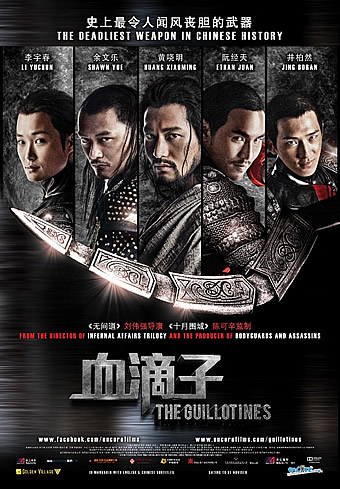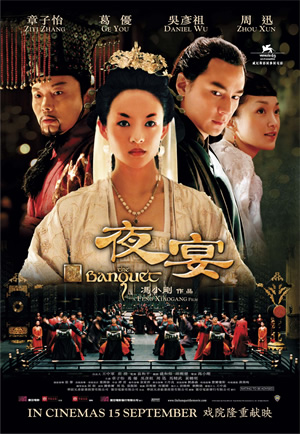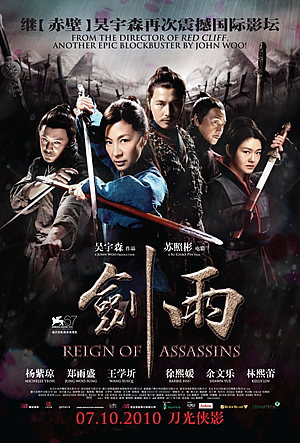THE ASSASSIN (刺客聂隐娘) (2015)
Genre: Drama
Director: Hou Hsiao Hsien
Cast: Shu Qi, Chang Chen, Zhou Yun, Tsumabuki Satoshi, Ethan Ruan, Xu Fan, Ni Da Hong, Yong Mei, Lei Zhen Yu, Hsieh Hsin-Ying, Sheu Fang-Yi, Jacques Picoux
Runtime: 1 hr 46 mins
Rating: PG
Released By: Shaw
Official Website:
Opening Day: 10 September 2015
Synopsis: 10-year-old general’s daughter Nie Yinniang is abducted by a nun who initiates her into the martial arts, transforming her into an exceptional assassin charged with eliminating cruel and corrupt local governors. One day, having failed in a task, she is sent back by her mistress to the land of her birth, with orders to kill the man to whom she was promised - a cousin who now leads the largest military region in North China. A slave to the orders of her mistress, Nie Yinniang must choose: sacrifice the man she loves or break forever with the sacred way of the righteous assassins.
Movie Review:
One thing’s for sure – the latest work by famed Taiwanese auteur Hou Hsiao Hsien won’t make a killing at the local box office. Sure, the leading figure of Taiwan’s New Wave cinema may have a huge following back home, but this reviewer doesn’t think his signature approach of using long shots and minimal dialogue to tell a story will go down very well with local audiences. This probably has got to do with the differences in history, culture and our familiarity with movies that feed viewers with obvious answers, but it’s a topic to be addressed on a separate occasion.
Hou, known for classics like 1989’s A City of Sadness (the Golden Lion winner at the 1989 Venice Film Festival stars a very young Tony Leung as a deaf and mute man), 2001’s Millennium Mambo (recipient of the Technical Grand Prize at the 2001 Cannes Film Festival) and 2003’s Café Lumiere (a homage to Yasujiro Ozu’s Tokyo Story), took home the Best Director Award at the 2015 Cannes Film Festival for his first foray into the wuxia genre.
It is probably inevitable then, to compare this 106 minute film with fellow Taiwanese filmmaker Ang Lee’s Crouching Tiger, Hidden Dragon (2000). Other than having well known actors to headline the production, these are two very different films.
Hou’s fans would know what to expect – this slow burning film takes its time to unfold the story of Yinniang (Shu Qi), a killing machine brought up by her mentor (Sheu Fang Yi). After a failed attempt to kill one of her targets because he was with his young son, Yinniang is tasked to kill the man she was betrothed to, as a form of training to harden her feelings. Tian Ji An (Chang Chen) is the target, a powerful leader in the state of Wei Bo. Somewhere along the mix, there is a jealous wife (Zhou Yun), a pregnant concubine (Hsieh Hsin Ying), a righteous guard (Ethan Ruan) and a idealistic young traveler (Tsumabuki Satoshi).
On paper, the story sounds like one which features webs of deceit, lots of bickering and tons of melodrama. Again, Hou knows better than to feed his viewers what they can probably get on TV. He paints human relationships with a palette of colours, breathtaking mis en scene that nothing less than perfect and a often distancing camera placement that makes you feel like you are but an observer.
There are many ways to read the film, but what’s more amazing is how you will be paying attention to the details in every scene, thanks to Hou’s regular director of photography Mark Lee Ping Bing’s masterful cinematography shot on 35mm film. The film opens with a black and white prologue, and the transition to bright colours in the next scene is a smart visual method to advance the story.
There is much to admire in the film, with credit going to editor Huang Chih Chia for the steadfast pacing, production and costume designer Hwarng Wern Ying for the elaborate setups, music composer Lim Giong for the unsettling score and sound designer Tu Duu Chin’s spot on depiction of the surroundings.
Shu and Chang have co starred in Hou’s Three Times (2005), and the yearning between their characters in this film is exasperatingly affectionate. The two Taiwanese stars manage to anchor themselves in an otherwise sparse film, thanks to Hou’s direction.
There are lots to talk about and discuss in this gem of a film, and we highly recommend viewers to put away all expectations of clarity and closure while watching this piece of art, and take time to appreciate the wondrous possibilities of what this film has to offer.
Movie Rating:




(The slow burning film is a gem, and while it may alienate some audiences, Hou’s award winning work is one to be appreciated like a finely crafted piece of art)
Review by John LI
You might also like:
-10september2015.jpg)
Movie Stills
.jpg)
.jpg)
.jpg)

.jpg)


